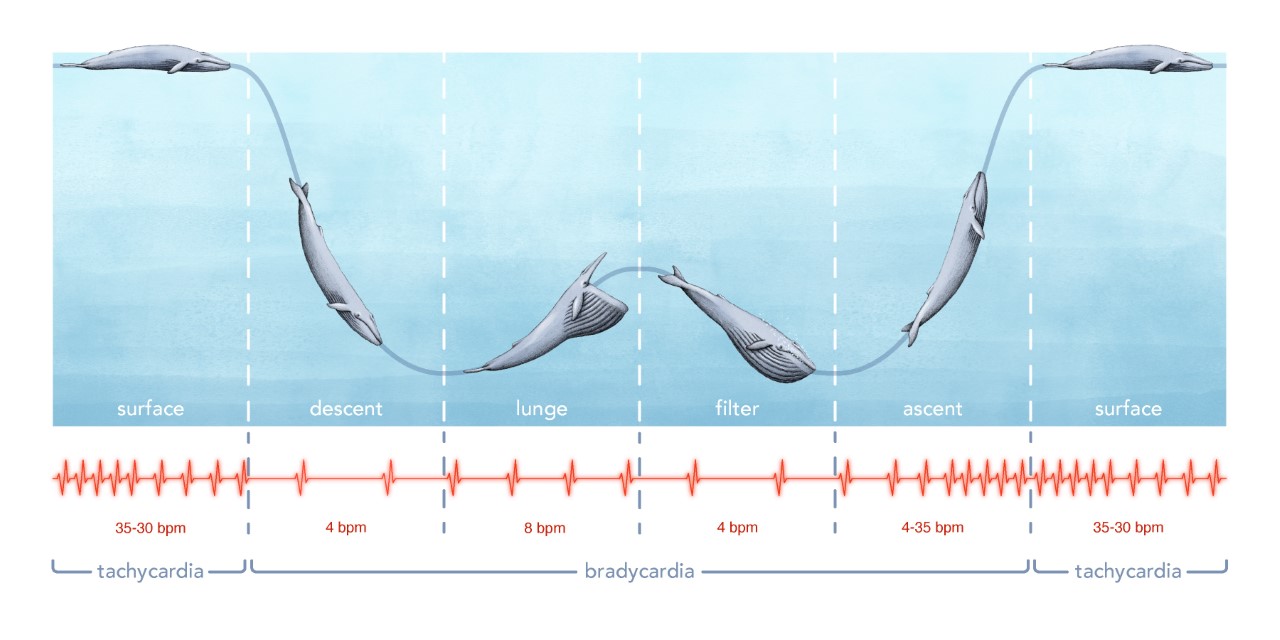
The heart rate of the blue whale – the largest animal on Earth – has been recorded for the first time, scientists say.
Researchers waited for the whale to surface before reaching out with a long pole to attach a non-invasive electrocardiogram to its skin.
Four suction cups secured the sensor-packed tag near the whale’s left flipper, where it recorded the heart rate through electrodes embedded in the centre of two of the suction feet.
Jeremy Goldbogen, assistant professor of biology in the School of Humanities Sciences at Stanford University in America, and lead author of the paper, said: “We had no idea that this would work and we were sceptical even when we saw the initial data.
“With a very keen eye, Paul Ponganis – our collaborator from the Scripps Institution of Oceanography – found the first heart beats in the data.
“There were a lot of high fives and victory laps around the lab.”
Scientists say their analysis of the data suggests the blue whale’s heart is working at its limit, which may explain why the creatures have never evolved to be bigger.

They say this may also help explain why no animal has ever been larger than a blue whale – because the energy needs of a larger body would outpace what the heart can sustain.
The research published in Proceedings of the National Academy of Sciences shed light on the extreme ranges of heart rates in blue whales during diving, feeding, and surfacing.
Blue whales slow their heart rate for deep dives but expend energy to lunge forward and engulf water for filtering and feeding.
Researchers monitored the heart rate of the whale along the surface of Monterey Bay during 8.5 hours of diving.
Foraging dives lasted as long as 16.5 minutes and reached a maximum depth of 184 metres, whereas surface intervals were typically less than four minutes.

Heart rates during dives reached a minimum of two beats per minute, well below the predicted resting heart rate of 15 beats per minute, and surged to 2.5 times the minimum heart rate during lunge feeding.
During surface intervals, the heart rate reached 37 beats per minute after very deep dives, near the blue whale’s maximum heart rate, as the whale worked to re-oxygenate its tissues.
Scientists say their results show how the circulatory system of whales adapts to accommodate diving and feeding.
Ten years ago Prof Goldbogen and Mr Ponganis measured the heart rates of diving Emperor Penguins and for years wondered if they could do the same for whales.
Prof Goldbogen said: “I honestly thought it was a long shot because we had to get so many things right – finding a blue whale, getting the tag in just the right location on the whale, good contact with the whale’s skin and, of course, making sure the tag is working and recording data.”


Why are you making commenting on The National only available to subscribers?
We know there are thousands of National readers who want to debate, argue and go back and forth in the comments section of our stories. We’ve got the most informed readers in Scotland, asking each other the big questions about the future of our country.
Unfortunately, though, these important debates are being spoiled by a vocal minority of trolls who aren’t really interested in the issues, try to derail the conversations, register under fake names, and post vile abuse.
So that’s why we’ve decided to make the ability to comment only available to our paying subscribers. That way, all the trolls who post abuse on our website will have to pay if they want to join the debate – and risk a permanent ban from the account that they subscribe with.
The conversation will go back to what it should be about – people who care passionately about the issues, but disagree constructively on what we should do about them. Let’s get that debate started!
Callum Baird, Editor of The National
Comments: Our rules
We want our comments to be a lively and valuable part of our community - a place where readers can debate and engage with the most important local issues. The ability to comment on our stories is a privilege, not a right, however, and that privilege may be withdrawn if it is abused or misused.
Please report any comments that break our rules.
Read the rules here